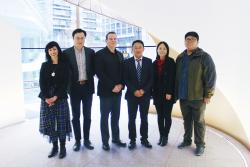
As the world moves towards an increasingly digital future, a new research collaboration between the UTS School of Communication and the School of Journalism and Communication at Shanghai University (SHU) is set to explore the impacts of technology on media consumption in Australia and China.
Part of the UTS Key Technology Partnerships program, the collaboration will call on the schools’ shared expertise in the area of media and communication studies. UTS Communication academics are known for their work on the role of journalism in shaping political, social and cultural democracy, while researchers at Shanghai University are studying the convergence of technology and culture; new media copyright; and big data studies in social media.
As such, the KTP collaboration, which is led by Professor Mark Evans at UTS and Dr Niu Panqiang at SHU, focuses on developing a comparative media analysis between Shanghai and Sydney. The body of work aims to extend debate and discussion between China and Australia on key issues impacting both countries.
“The research will canvas how key institutions of governance, education, media and consumption have been transformed by digital technologies over the last 20 years”, says Prof Evans.
“We are particularly interested in privacy concerns around big data, the growth of social media influencers, the effects of ‘echo chambers’ online, and the rise of citizen journalism. We will tease out similarities and contrasts between China and Australia.”
To date, the collaboration is comprised of three major projects that will lead to a series of joint publications. The first will look at the role and reach of social media influencers in both cities, while the second will look at citizen journalism and its impacts on public discourse in each location.
The third will examine the internet-driven phenomena of filter bubbles (where search engine or website algorithms present readers with information that corresponds to their existing beliefs), crowd cultures (previously isolated individuals or groups brought together by social media) and other emerging sites of pertinent interest in both Sydney and Shanghai.
“In addition to these three initial areas of interest, there is ample scope to develop more robust and long-term research collaborations in the areas of health communication, creative industries and consumer cultures,” says Professor Evans.
“These broad topics draw on existing research expertise and interests at both UTS and SHU and offer opportunities for more substantial research outputs.”
The research collaboration was launched in 2019, with participating SHU academics spending a week at UTS. They attended meetings, seminars and workshops; built new collaborative relationships; and fleshed out a program of work for the next 18 months.
The ongoing collaboration will produce joint publications, new research partnerships, and external funding opportunities, as well as collaborative PhD students. Students at both universities will also benefit from increasingly internationalised curricula that draws on the outcomes of the work.
“There are so many benefits from this KTP program. I think the most important outcome is the agreement to establish a PhD co-supervision program between our two schools,” says Dr Niu.
“My school has established lots of smaller programs with UK and US-based universities, but they’re all at undergraduate and master’s level.
“This is our first time for dual PhDs, so that’s the number one benefit for Shanghai University.”
The UTS Key Technology Partnerships program aims to build strategic research relationships between UTS and international partner universities. For Professor Evans and his UTS colleagues, engaging with the KTP initiative is the latest in a series of activities to build the profile of the Faculty of Arts and Social Sciences, which has been on a steady trajectory of internationalisation over the last few years.
“For us, this partnership with SHU puts us on an international standing with key universities around the world,” Professor Evans says.

